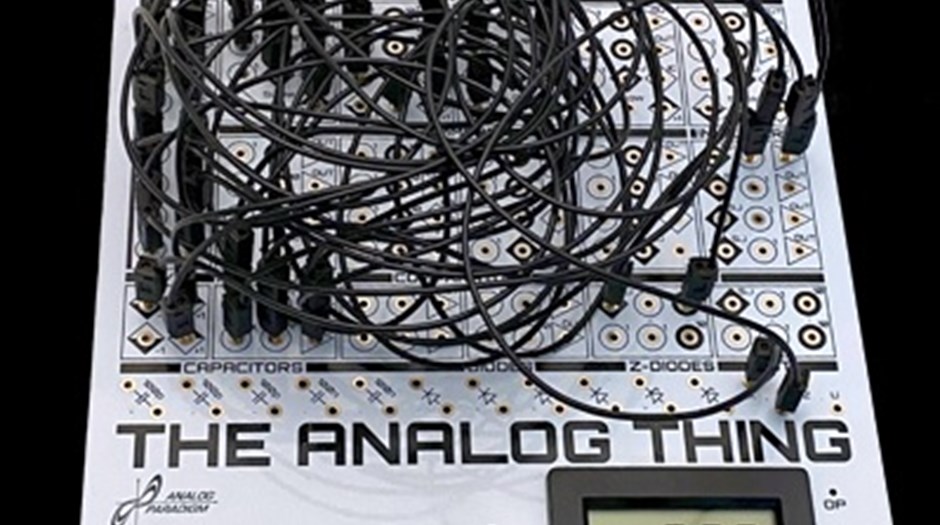01 November 2022
A state of the art, high performance computer for £200?

I saw the announcement of THAT (THe Analog Thing - https://the-analog-thing.org/) this morning, and I had to have one. I haven't prgrammed an analogue computer since 1978 (2nd year in my Engineering degree), and I'm looking forward to trying this one one. It's the first affordable analogue computer. And it is very relevant to teaching computer science, today. Do you think I'm mad? Let's start with two questions:
1. Which came first?
a. analogue electronic computing OR
b. digital electronic computing
2. Which one is true?
a. Analogue computing gets its name from the fact that it processes analogue signals
b. Analogue signals get their name from analogue computing
How did you do? The very surprising thing - to most people - is that the correct answer to both questions is b. Although mechnical analogue devices existed before mechanical digital ones, electronic analogue computers did not develop until after electronic digital computers, and the term 'analogue' was applied only to signals (and electronic circuits) after the digital-analogue dichotomy had appeared in computing. The important thing that this should tell you is that analogue computing wasn't a kind of primitive ancestor of the modern computing it was a conscious divergence from it.
Analogue computers were much better for certain kinds of computing: high-speed simulation and control, applications where you were far more interested in the qualitative result than in the quantitative result, and applications where the data set was fixed and your challenge was to vary the program until you got to the desired result, not vice versa.
It wasn't until the 1970s that digital computers even started to be able to tackle the kinds of problems that analogue computers excelled at, and that wasn't solely down to Moore's Law - it also required huge advances in peripherals: ability to display results graphically in high resolution, and to accept qualitative inputs (via a mouse or touch screen gestures).
THAT - THe Analog Thing. (I'm not fussy about the 'analog/analogue' spelling variants, BTW) was designed by Prof. Bernd Ulmann. I met Bernd in Germany just before lockdown, when he gave me a personal half-day tour of the world's largest museum devoted to analogue computing. Turned out this was his home, and every single room is crammed, literally, floor to ceiling with analogue computers, many of them in running order. (He then said, 'Let's have lunch. My wife has cooked us something nice'. His wife? Very happily married, apparently - but, at least in part, that's because she has her own house about 200 metres away!)
He's a terrific evangelist for analogue computing, and believes it will make a comeback - and before quantum computing becomes practicable.
One of the big attractions, today, he says, is that analogue computers can be ultra-low powered. Any form of digital switching his hugely inefficient in energy terms - because every single bit-flip involves overcoming the necessary forces working to keep the circuit in one of its two stable states. (Think of flipping a light switch in your home. If the spring wasn't there holding it in the on or off position, it would just randomly flip on and off with the slightest vibration in your home). Medical analogue computers (for example an artificial pancreas, detecting the need and controling the supply of insulin) could be powered entirely from a thermocouple picking up your body heat - no need for a battery.
I'm also minded of something that Vanevar Bush (who invented the Differential Analyzer) said. Not only could his analyzer (a mechanical analogue computer) solve complpex partial differential equations for which no mathematical solution could be found, but, importantly, he has shown that programming a differential analyzer actually gave people a far better understanding of - you might say 'feel for' - differential equations than manipulating symbols on paper or a balckboard.
I realise that in the current climate, spending £200 on device not required by the syllabus will be a big ask for many school CS departments. But maybe you can share the cost with the better-heeled Physics department - it's just as relevant to them, and arguably to the (A-level) Maths teaching, too.


Discussion
Please login to post a comment